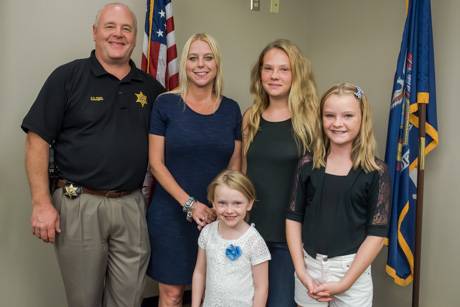
Over his 28 years in law enforcement, Kris Kautz has helped a lot of people and that's the best part of the job.
Mostly, it's about helping the victims of crime, mainly by finding the people who stole from them or harmed them or a member of their families.
But sometimes it's helping those same criminals get their lives turned around.
Now he's moving on to a job he thinks will be just as gratifying -- a security aide for Batavia City Schools.
"It’s a more laid-back position, obviously, but I’m looking forward to it, working with the kids and the school seems awesome," said Kautz, whose last day with the Sheriff's Office was Friday.
Kautz started with the department in 1988, three years after earning an associate degree in criminal justice at GCC.
"After I graduated, I realized to get those jobs, I would need to take exams," Kautz said. "That’s a good theory, I think. Do well on the exam and you should be a good candidate. Unfortunately, I wasn’t a very good test taker. I took many exams before I actually got a phone call. It was almost three full years before I got a job offer, and then, of course, I got three decent job offers within a month-and-a-half. Luckily, this job was one of them and it was really the job I was hoping for, so I accepted the position as a deputy."
Kautz was on road patrol for five years when he was promoted to investigator, the job he wanted all along.
He said he's been fortunate to stay in that position for 23 years, but now it's time to move on.
"You do reach a burnout factor," Kautz said. "I've probably reached the end of my shelf life. I'm not embarrassed to say that. I like to think I’ve done my part and it’s time to move on."
Leaving now isn't without its drawbacks. There are unsolved cases Kautz wishes were closed during his time in the investigator's office
"Those are kind of a sore spot," Kautz said. "Sometimes you know who you think did it, and you’re really close to solving it, but you just don’t have that extra piece."
Among the unsolved cases, Kautz worked are on is the Fickel murder.
"We worked long and hard on that for many, many months after that happened and unfortunately, the leads kind of started drying out and obvious we had another case load we needed to attend to," Kautz said. "It doesn’t get the attention we wish it would. We don’t have the luxury of having a quote-unquote 'homicide division' or 'burglary task force' or a 'sex crimes team.' "
Kautz leaves with cases pending, but there is a person of interest and some solid evidence that might one day hold up in court, but it will be up to other investigators to uncover the piece of evidence that wraps things up.
"We have been actively pursuing it and we’re just kind of crossing our fingers that maybe that one little piece of the puzzle we don’t have yet might show up one of these days," Kautz said.
(If you have information that might assist in the case, contact the Genesee County Sheriff's Office at (585) 343-5000.)
Much has changed over 23 years in how investigators do their jobs. There is new technology and new techniques, but the basics remain the same -- gather evidence, safeguard it, ask questions, test answers and build a case.
"I'm not saying it (new technology) has made it easier to solve cases, but it's really solidified convictions," Kautz said. "When there is a fingerprint or DNA evidence at a crime scene, you can't dispute it. You have a hard time explaining that away when you're a defendant."
Too many cases, just by the nature of things, go unsolved, but when they are solved, it's a great feeling, he said, especially when you see the satisfaction on the faces of the victims.
"It’s all about the victims because when you come home after working a hard day, working an honest job, and come home and your door is kicked in and your TV and your family heirlooms are gone, you’re furious and it's devastating," Kautz said. "That’s where the cops come in and do their best to solve it and it’s very, very, very gratifying when you do solve it for them."
And sometimes, solving a crime helps another person improve their own lives, and that's a good feeling, too, Kautz said.
"People always say this is the best job in the world and I really think that," Kautz said. "You really have a chance to make a difference for people, in people’s lives, not only making it right for the victims but also maybe contributing to the improvement of some of the defendants' lives. Maybe getting arrested can often be a positive thing in the long run for somebody. They know they screwed up. They know they’ve got problems. They know they’ve got things they need to address. Sometimes getting arrested will be that last little push they need to really get their lives straightened out."
Photo: Kris Kautz with his family, wife Susan, and daughters Kelsey, Adeline and Ella.
